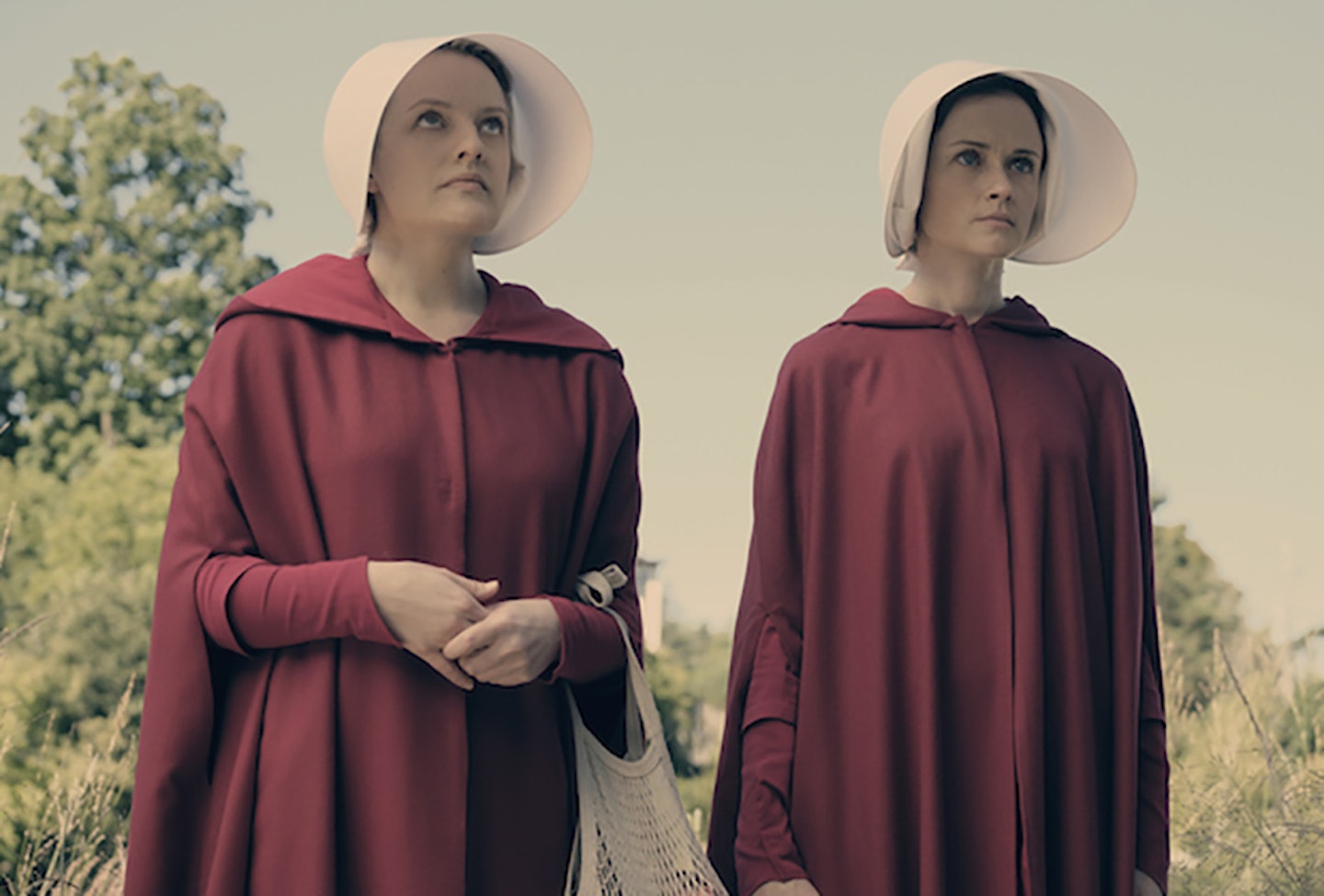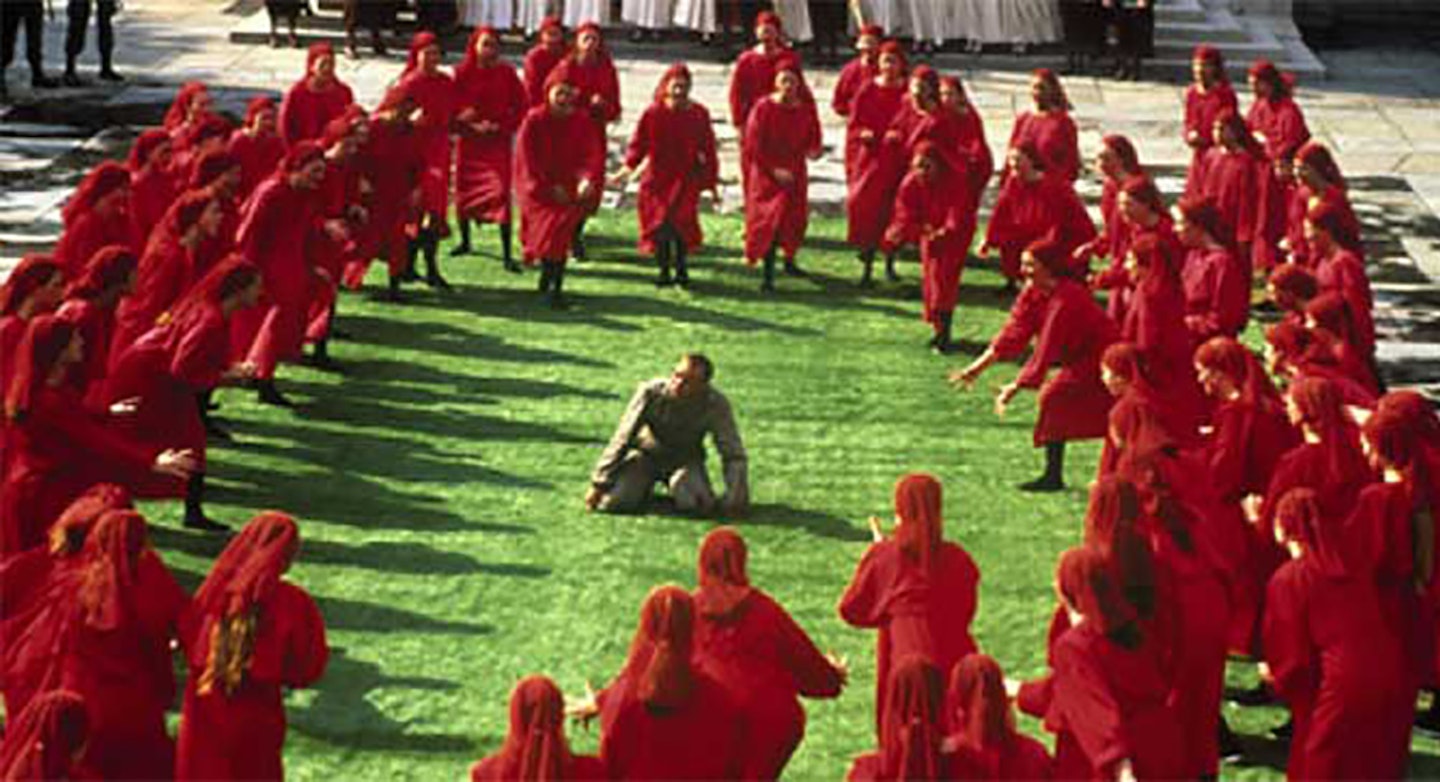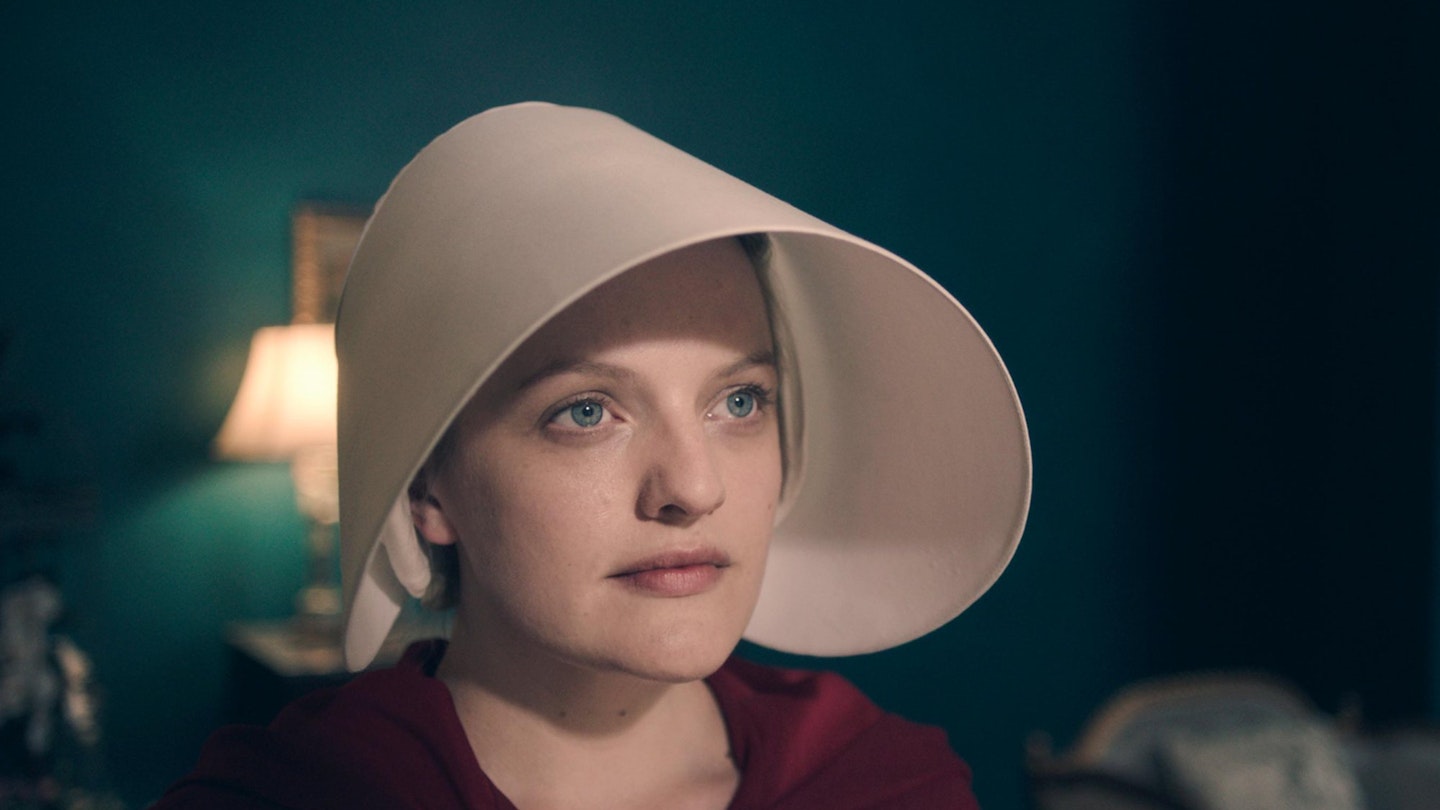As dystopian futures go, this one — from the novel by Margaret Atwood — has certainly gotten around, moving from novel to film, then opera and, now, a television series debuting on Hulu April 26th. Obviously with The Handmaid's Tale, there's still more to be explored.
This ten-episode series, starring Elisabeth Moss as the handmaid in question (Offred), is set in a dystopian future where fertility is a rarity and those who are, are forced to live as concubines for the totalitarian rulers of Gilead, which has arisen in what had been part of the United States. The show also stars Alexis Bledel as Ofglen, Joseph Fiennes as The Commander and Yvonne Strahovski as Serena Joy.
Bruce Miller, whose previous producing credits include Eureka, Alphas and The 100, serves as showrunner. In the following exclusive interview he provides an inside look at the creation and evolution of this world, which has some frightening similarities to our own.
The good thing is you're in an environment now that embraces this sort of thing, whereas in the past it could have been deemed too pessimistic a vision for a series.
You're coming from a situation where it's a well-known book. It's a classic book in the strange way that it's a classic from almost this generation, which there's not too many books like that, and the story's well-known. So what do you do to surprise people? You just don't shy away from the things that are in the book that you thought, "Oh, God, if you ever saw that happen on TV, your head would explode."
Is that what drew you to this material?
I actually read the book when I was in college, in a new fiction class, if you can believe that. That's how long ago it was. And I basically just loved the story and loved the character of Offred and was fascinated by how she manages to get through the day, not only coming out with her life at the end of it, but also keeping her sanity and in a lot of ways, her sense of humor and her sense of perspective. There's also just how big the world was that Margaret Atwood had created; how big and interesting. There were things that she mentioned in the book that were one sentence and I was, like, "I would love to see that whole thing expanded." I love books that are set in worlds that make sense to me, where you can extrapolate out logically.
So I think what attracted me to it really was the depth of this woman's courage and that her way of surviving reminded me a lot of how I hope I would try to survive in a really terrible situation. That she keeps her perspective and her sense of humor as much as possible, and she's scared shitless a lot, and she operates the same way ... it made me feel I could connect to her experience so well that that's really what attracted me to it.
Having done The 100 and now this, are you drawn to dystopian worlds?
I think for a lot of worlds, even when they don't seem dystopian or manufactured or created to the audience, that the stock and trade of a writer is to create a world that works as an entity in and of itself and is logical and has rules. That doesn't matter whether you're creating the apartment in Friends or whether you're creating Gilead. You're creating a world with rules. From the outside, dystopian seems like a genre, but from the inside, doing what I do, it's just another world. It just has more differences than the apartment in Friends. It certainly doesn't require any less attention to create one of those worlds than the other.
I always loved big world "what if" stories. The 100 was a really interesting world, because it was the idea of the world turned on its head where we were the aliens and people living on Earth were the residents who were fighting us off, which is really cool. Things like that appeal to me, because when you look at The Handmaid's Tale, it takes place now rather than the future. It's a different past. The book is a little bit in the future, but we decided to square it up with today.

Almost every other dystopia focuses a lot on the "dys" and this one doesn't. This is beautiful, and the air is clean. So it's really, really nice on the outside and horrible and brutal, Byzantine, Kafkaesque on the inside. It makes you feel kooky in a really good way. It kind of makes you realize that the people who are doing things that you think are reprehensible, share some of the same goals that you do, even if they have reprehensible ways of trying to achieve them. What's more attractive: The big field of rubble or the robot chasing you? There really isn't too much nice about it.
One of the most powerful moments in the show is that these women live so oppressed a life, but then you get a moment where they unleash justice against an alleged rapist and we see them really let loose.
It certainly was in the book. You realize that the human being needs some way to let loose all of that fury, and they built that into the system. The other thing to remember is the guy is a rapist or not a rapist. We have no idea. All we know is that they tell us he's a rapist. And so that's where you're kind of back in that gray world of Offred's point of view, where truth is a little more muddy. The only truth that she knows is the guy's lying there dead and she was a part of that.

There's a certain level of human understanding that it requires to set up a system where you repress people so much and then also understand that they need these kind of outlets. I think it makes you feel like the Gilead government is even worse. Because it isn't like they believe that human beings are a certain way and they can be controlled and corralled and pray away all of their natural human instincts. They don't believe that. What they do, instead, is channel all those horrible instincts in a direction so they're recognizing that they exist, which is kind of awful. It would be better if they were deluded into thinking that everybody was just a passive little lamb, when in fact, they understand human nature a lot better than they're letting on. And certainly they've set up a Byzantine and complicated and awful way for them to get their ya-ya's out, as the expression goes. They know how what they do affects people and still they make them as a monolithic government even more nefarious.
A chilling moment that took place while watching the first episode is that we had a separate monitor playing the news and there was a discussion of Donald Trump. It sounded, for just a moment, as though it was a part of the show. It wasn't, but the fact that it seemed to fit so seamlessly was frightening.
One of the things that's interesting about the book is that whenever for the past thirty-five years since it's been out, it's always been relevant. Politically relevant for something that's been going on, or some movement that we're making towards or away from something, and so now I think it's getting a moment where it seems to be even more prescient and even more on point and more illustrative of the challenges we're facing today. The book is perennially relevant and I think that's a real tribute to Margaret putting her finger on one of the things that just is not going to go away in our society, which is the arguments about religion, the arguments about men's and women's roles. She really put her finger on the things that we're going to be fighting about from now until eternity. I think there's a lot of similarities between the fear and confusion and complete opaqueness that Offred feels about the government and what we feel now.
Did you get that sense while you were developing the show?
Everybody knows there are dark corners and not-so-nice things that people feel and believe in every country. The remarkable thing about this election cycle is that people were saying them out loud. That really was helpful for us, because all of a sudden, people aren't shy about saying what I think are kind of dastardly and backward thinking. But they're saying them out loud so that we can actually understand, "Oh, okay. That's where that thinking starts. That's the first step." And I think that's probably what you were reacting to with your other open window was that it's not that we're there, but you can all of a sudden see the path much more clearly than you could before.
• Elisabeth Moss Starring In New TV Adaptation Of The Handmaid's Tale
• TV News: Gilmore Girl Joins Handmaid's Tale, Charmed Reboot And DC's Powerless Trailer
